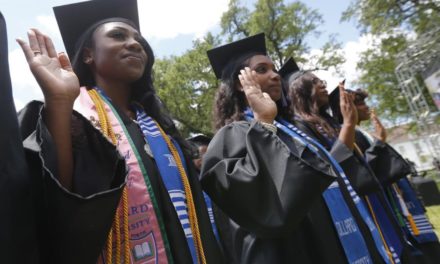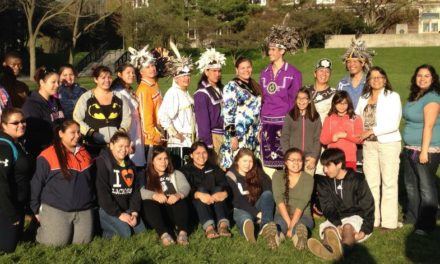By Lannae O’Neal (@Lannaeoneal)
The Undefeated —
Founder of new anti-racism center at American University

Ibram Kendi, right, addresses the audience as Washington Post reporter Wesley Lowery, who was the presenter for the event, stands by. ANDRÉ CHUNG FOR THE UNDEFEATED
It’s a Wednesday night at a bookstore in a well-off part of Washington, D.C., and every seat is taken. More than 100 people spill into the aisles or crowd the stacks past the philosophy and cookbook sections to hear Ibram X. Kendi talk about the racist ideas that founded the nation. About how racial progress is always followed by new and more sophisticated racist progress. And, especially, about the deeply held beliefs that most Americans, including black people and liberal whites, woke up with this morning that they don’t even know are racist and wrong.
For instance, “Black neighborhoods are not more dangerous than white neighborhoods and neither are black people,” Kendi tells the crowd. Layers of racist ideas account for why we think so.
Last year, the 35-year-old scholar became the youngest person to win the National Book Award for nonfiction in 30 years for Stamped from the Beginning, The Definitive History of Racist Ideas in America.
And this year, his moment continues. He’s just moved to Washington, where he is launching the Antiracist Research and Policy Center at American University next week. He’s a historian of racism at a time when our public conversation is fixed on it, when successive presidents have triggered the tribal apprehensions of our Mason-Dixon lines, and when the threat of shoot-you-down, run-you-over racial violence feels as close at hand as the peril to the republic from fake facts and revisionist history. This convergence of circumstances keeps him perpetually on book tour.
With the breadth of his scholarship and expanse of his reach, Kendi has been compared to the famed late historian John Hope Franklin, except he wears his locs long and his edges laid. He used to fantasize about a career in the NBA — or, at the very least, on SportsCenter. He’ll hit you back on Twitter.
Just so you know, black people are not inherently better athletes than white people, Kendi says. We only think so because “black people have not only been rendered inferior to white people, they’ve been rendered like animals,” and thus physically superior creatures. It’s an old racist idea that helped justify African-Americans’ suitability for backbreaking labor and medical experiments and the theft of their children. “When we embrace this as part of our identity,” Kendi says, “we don’t understand.” He wants to correct our misunderstandings.
Education, love and exemplary black people will not deliver America from racism, Kendi says. Racist ideas grow out of discriminatory policies, he argues, not the other way around. And if his new center can help identify and dismantle those policies in the U.S. and around the world, he believes we can start to eliminate racism. At least that’s the goal.

A diverse group made up a standing-room-only audience during Dr. Ibram Kendi’s recent book promotion event at Politics and Prose. ANDRÉ CHUNG FOR THE UNDEFEATED
As the evening wears on in the crowded bookstore, people line up at microphones to question, challenge or offer up hosannas to this young scholar, who, in many ways, is just getting started.
Kendi apologizes for the spare office space he shares with a colleague inside American University’s School of International Service. The walls are bare, and his name has not yet made it outside the door. He’s still unpacking from the move to D.C. with his wife, Sadiqa, a pediatric emergency room physician at Children’s National Health Center, and their 1-year-old daughter, Imani. It’s an ambitiously busy life.
Besides being the founding director of the research center, he’s teaching history and international relations as part of a joint appointment that brought him from the University of Florida, where he was a professor of African-American history.
He’s learning the city, and working on priorities for the center — part think tank, policy shop and incubator for anti-racism strategies — which formally launches next fall. It joins dozens of other customized centers of racial research. One of the earliest and most notable, the W.E.B Du Bois Research Institute at Harvard University, rose to prominence under the leadership of Henry Louis Gates Jr. This year, “year zero,” is to raise funds and recruit researchers, faculty and students.
The goal is to identify inequalities, identify the policies that create and maintain those inequalities, and propose correctives in six areas: criminal justice, education, economics, health, environment and politics. Kendi also hopes to create an online library of anti-racist thinking. He’s still considering initial projects.
But when he talks about racism, he is not still puzzling out his ideas. Kendi has spent thousands of hours reading thousands of documents, including “some of the most horrific things that have ever been said about black people,” to uncover the origins of racist thought.
His words are distilled, precise, authoritative. His voice never rises. He is, temperamentally, an antidote to the heat of the subject matter and the hyperbole of the times.

Ibram Kendi is the new founding director of The Anti-Racist and Policy Center at American University. He is a leading thinker on race and his 2016 book, “Stamped from the Beginning: The Definitive History of Racist Ideas in America” won the National Book Award. ANDRÉ CHUNG FOR THE UNDEFEATED
“We have been taught that ignorance and hate lead to racist ideas, lead to racist policies,” Kendi said. “If the fundamental problem is ignorance and hate, then your solutions are going to be focused on education, and love and persuasion. But of course [Stamped from the Beginning] shows that the actual foundation of racism is not ignorance and hate, but self-interest, particularly economic and political and cultural.”
Self-interest drives racist policies that benefit that self-interest. When the policies are challenged because they produce inequalities, racist ideas spring up to justify those policies. Hate flows freely from there.
The self-interest: The Portuguese had to justify their pioneering slave trade of African people before the pope.
The racist idea: Africans are barbarians. If we remove them from Africa and enslave them, they could be civilized.
“We can understand this very simply with slavery. I’m enslaving people because I want to make money. Abolitionists are resisting me, so I’m going to convince Americans that these people should be enslaved because they’re black, and then people will start believing those ideas: that these people are so barbaric, that they need to be enslaved, or that they are so childlike that they need to be enslaved.”
Kendi boils racist ideas down to an irreducible core: Any idea that suggests one racial group is superior or inferior to another group in any way is a racist idea, he says, and there are two types. Segregationist ideas contend racial groups are created unequal. Assimilationist ideas, as Kendi defines them, argue that both discrimination and problematic black people are to blame for inequalities.
“The actual foundation of racism is not ignorance and hate, but self-interest.”
Americans who don’t carry tiki torches react viscerally to segregationist ideas like those on display at the white nationalist rally in Charlottesville, Virginia, that left one young counter-protester dead. Assimilationist ideas are more subtle, seductive and coded.
“You can be someone who has no intention to be racist,” who believes in and fights for equality, “but because you’re conditioned in a world that is racist and a country that is structured in anti-black racism, you yourself can perpetuate those ideas,” says Kendi. No matter what color you are.
Anti-racist ideas hold that racial groups are equal. That the only thing inferior about black people is their opportunities. “The only thing wrong with black people is that we think there is something wrong with black people,” a line that Kendi uses like a mantra.
The Blue Lives Matter (the problem is violent black people) Black Lives Matter (the problem is the criminal justice system, poor training and police bias) and All Lives Matter (the problem is police and black people) arguments are extensions of the same, three-way debate (segregationist, anti-racist and assimilationist) that Americans have been having since the founding of the country.
“We’ve been taught American history as a steady march of racial progress,” but it’s always been a dual march of racial and racist progress, which we see from Charlottesville to “their Trump Tower,” Kendi says.
This is the jump-off Kendi uses to frame the most roiling issues of the day. But before he could build that frame, he first had to deal with his own racism.

Ibram Kendi. ANDRÉ CHUNG FOR THE UNDEFEATED
Kendi was born Ibram H. Rogers in Jamaica, Queens, New York, to parents who’d been student activists and were inspired by black liberation theology. He grew up playing basketball and still is an ardent New York Knicks fan.
The family moved to Manassas, Virginia, where Kendi attended Stonewall Jackson High School (named for the Confederate general) and dreamed of a career on the hardwood. The slim, 6-foot-1 former guard says he specialized in the no-look pass. “I consider the beautiful pass the most beautiful part of the game of basketball,” he says.
Sweet passing aside, his basketball aspirations were irrevocably dashed his sophomore year when he failed to make the junior varsity team. “I was so crushed,” Kendi says.
He studied journalism at Florida A&M University and initially wanted to be a broadcaster or a sportswriter. But after internships at The Mobile Register and The Atlanta Journal Constitution, he began to shift his career focus. He wound up getting a doctorate in African-American studies from Temple University. His first book, on the black student protest movement in the ’60s and ’70s, was published in 2012. He began researching Stamped from the Beginning the following year.

That’s when he started to re-examine some of his most deeply held beliefs about race. “I was born into a world of racist ideas, many of which I had consumed myself,” says Kendi. “I had to come to grips with … some of the things that I imagined and thought,” about black people “and one of the first and most obvious ones was the idea that black neighborhoods are more dangerous than white neighborhoods, which is a very popular idea.”
The highest instances of violent crime correspond with high unemployment and poverty, and that holds true across racial lines, Kendi found. Most white poverty, unemployment and thus violent crimes occur in rural areas, while for blacks those ills are more concentrated in densely populated urban neighborhoods. If impoverished white communities “had five times more people, then that community would have five times, presumably, more violent crime.”
“I was born into a world of racist ideas, many of which I had consumed myself.”
Another racist idea: “I believed that black children were achieving at a lower level than white children. And I believed in the existence of an achievement gap,” says Kendi. Standardized tests prioritize reading and writing as measures of verbal proficiency, as opposed to the wider ability to articulate. And they test subject areas where black schools are vastly underresourced.
“I certainly am somebody who advocates equalizing the resources of school and creating a situation in which we actually live up to our pronouncements that we live in a meritorious society,” says Kendi. “But even if these schools persist in being resourced unequally, that doesn’t necessarily mean that the students in the schools with lesser resources are intellectually inferior to the students with better resources.” He reaches into history to illustrate his point: Just because slaves’ lives were circumscribed, they faced more adversity and they dealt with more violence, that doesn’t mean enslaved people were inferior to people who were free.
A “more lighthearted area” he had to confront was his ideas about dating black women. “Black women were angry, they didn’t know what they want, they’re difficult,” he’d heard. “And from my standpoint, those are some of the things that I said when I was having some difficulties in dating.” When we have negative experiences with individuals, “we often say there’s a problem with that black group,” without realizing those are racist ideas.
Now, he’s a poster child for black love. He and his telegenic wife met on Match.com and debuted their new last name Kendi (“loved one” in the Kenyan language of Meru) at their 2013 wedding in Jamaica, which was featured in Essence magazine.
Mark Anthony Neal, a professor of African and African-American studies at Duke University, calls Kendi part of a vanguard of young black historians, which includes Treva Lindsey at Ohio State and Brittney Cooper of Rutgers, who are transforming the field. Part of what makes him right for the moment is his ability to speak to millennials, who have access to lots of information but can’t always decipher what is good or bad. “What he has written is an accessible history of black folks,” said Neal. In terms of a book for general readers “that covers such a wide historical period, the only thing I can think about in terms of comparison is John Hope Franklin’s From Slavery to Freedom.”
Kendi’s book resonates like the 2015 National Book Award winner, Between the World and Me by Ta-Nehisi Coates, said Neal. “Ta-Nehisi’s was kind of an emotional analysis of what this moment is. Kendi’s was to bring that kind of energy, except to do it in a historical context. I think it’s important to be able to talk about the history of these racist ideas, the impact they’ve had on black people and black life.”
With regard to the most front-and-center issue in sports today, athletes and activism, Kendi says it’s important to remember that the athlete/activists of the 1960s — Muhammad Ali, Jim Brown and Tommie Smith — all spoke out in the context of the Black Power movement, which is “precisely what’s happening now” with Colin Kaepernick and others who were inspired by Black Lives Matter. “We look for athletes to generate movements, when historically athletes have been good at being athletes, which is precisely what they should be good at, and we should be looking to activists to generate movements.” There will then be those athletes who use their platforms to support those movements and ideologies.
Kendi says that while the numbers of black players on the fields, courts and arenas have increased dramatically over the past 50 years, it’s been harder to make shifts at other positions.
“We should determine diversity in sports, just like outside of sports, not by the transient players but by the people who are permanent, like the owners, like the coaches, like the sports writers, like the executives.” If those groups “are lily-white, then [a sport] is simply not diverse.”
This kind of analysis gives Kendi cachet beyond the ivory tower and makes him popular with students, Neal said. Young people see Kendi with his locs and his ability to communicate in a vernacular they know and that expands their thinking about the possibilities for their own lives. They’ll say, “This is somebody I can imagine being somewhere down the line,” said Neal.
Peter Starr, dean of the College of Arts and Sciences at American University and one of those responsible for bringing Kendi to the university, cites Washington as an organic place to do anti-racist work. “To make real lasting change, change that lasts beyond changes of administrations and flips from one party to the next, you really need to reach out to people who are making more fundamental policy on the ground, in the agencies and throughout the government,” he said.
Starr calls Kendi’s vision to use researchers from around the country an approach that mirrors what happens in the sciences. “He’s got a very expansive vision of the center, and we really think this is a center that’s not just the usual, relatively small, one-person shop,” he said.
He calls Stamped from the Beginning the kind of book scholars write in their 50s and 60s. But Kendi’s impact will transcend the written words, Starr said. Especially since American has struggled with racist incidents recently.
In May, bananas were found hanging from nooses at three locations on the American University campus. This followed racist social media messages and a banana thrown into a black student’s dorm in the past few years.
For students of color and “all students, being able to look to someone like Ibram Kendi, who is a model of intelligent scholarship and activism informed by deep contextual and historical understanding,” is powerful, said Starr. He’s got “a fire to make a difference in the world that I’m not sure I’ve ever seen in another scholar, frankly.”

Ibram Kendi greets fans at Politics and Prose after discussing his book. ANDRÉ CHUNG FOR THE UNDEFEATED
At the bookstore, the questions, and disquisitions posing as questions, continue as the crowd grapples with, or pushes back against, Kendi’s ideas about race and America.
“I think that the issue is that the Africans and the Europeans really can’t mix,” one person steps to the mic to say.
Across the room, another questioner says, “Gentiles are underrepresented on Wall Street. White males are underrepresented in the NBA. At what point does the assimilation shift into something where other factors come into play?”
“All right now, tell it like it is,” says E. Veronica Pace, a genealogist who steps to the microphone and identifies herself as a student of Howard University sociologist E. Franklin Frazier. She asks about the book’s title, which was taken from a speech in which Confederate President Jefferson Davis called racial inequality “stamped from the beginning.”
Finally, the talk is over and people form a line that stretches toward the door to have him sign their books. “If we are all mindful about this and put our hearts and souls into it, we can turn this ship around,” says James Kilgore, whose wife is in the line. He’s says he’s waiting to see what Kendi is going to do.
For starters, he’s working on another book, a memoir entitled How to be An Anti-Racist. “Racist ideas become almost like a drug. Once you hear them and become hooked, you need more in order to sustain the way you see the world, right?” Kendi says. “I was hooked for a long time,” and now “I’m trying to relieve other people.”
And he’s focused on launching the center he’d like to help change the world. The former sports reporter reaches for a metaphor. It’s a rare moment where his equanimity seems to falter, just for a bit, perhaps from the weight of the task at hand. “I’m on the court and I’ve suited up. Now the game is about to start and I have to be ready to perform,” Kendi says. “And to win.”





